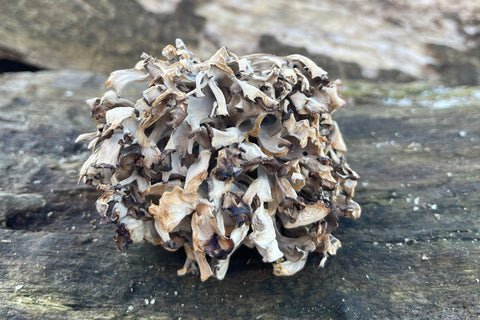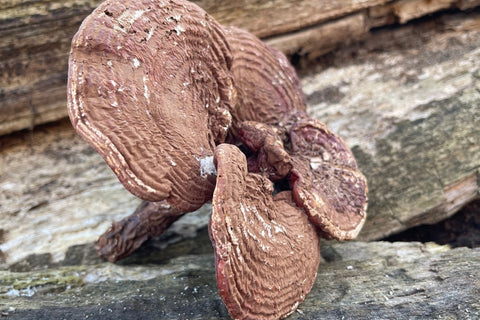What is Inflammatory Bowel Disease (IBD)?
Inflammatory bowel disease (IBD) is an umbrella term to describe two conditions: Crohn’s disease and ulcerative colitis. Both are long-term diseases associated with gut inflammation.
Ulcerative colitis affects 1 in 420 people in the UK, while Crohn’s disease is estimated to affect 1 in 700 people. Both can manifest between 15-30 years of age, but can also happen between 50-70 on rare occasions.
Causes of IBD
The exact cause of IBD isn’t confirmed, but experts agree it’s the culmination of a weakened immune system. They suggest IBD can happen if your immune system incorrectly responds to environmental hazards and triggers, including bacteria, viruses, and other toxins that can cause gastrointestinal distress or inflammation.
Symptoms of IBD
- Those diagnosed with IBD have the following symptoms:
- Bloody or recurring diarrhea
- Unexplained weight loss
- Chronic fatigue
- Belly aches and/or swelling with cramps
Mushrooms for IBD
There’s currently no cure for either ulcerative colitis or Crohn’s disease, but…
There are various treatment options. Treatment options for IBD include specific diets, lifestyle changes, prescription pills, and sometimes even surgery.
Science has recently looked at mushrooms as potential IBD treatments, particularly Maitake, Reishi, and Chaga.
Maitake for IBD

The maitake mushroom is often spotted at the base of oak trees during fall and spring across Europe, Asia, and North America. The mushroom is rich in fibre, proteins, and different minerals like magnesium, iron, and zinc. It is also rich in antioxidants and beta-glucans.
Some benefits maitake is known for include strengthening immunity, lowering inflammation, and improving cardiovascular health.
The Maitake mushroom has been shown to reduce markers of inflammation and compounds that trigger it, making a case for maitake to be part of chronic inflammation treatments, including IBD.
Colon inflammation is associated with IBD, and a study in 2009 confirmed the mushroom’s potential as an IBD treatment. The researchers found that a maitake water extract can suppress TNF-alpha, an inflammatory response promoter involved in IBD. [1]
Maitake Supplement Suggested Dose:
3g or 6 capsules (500mg each) daily.
Reishi for IBD

Sometimes referred to as Lingzhi, reishi is a mushroom that grows in many humid locations throughout Asia and routinely used in Eastern medicine for hundreds of years. The mushroom is credited to help with stress, immunity, fatigue, and even allergies.
Reishi contains polysaccharides, beta-glucans, and triterpenes. These three are known to exhibit powerful health benefits for cardiovascular health and chronic inflammation and possess high antioxidant activity.
A study in 2012 confirmed reishi supplementation can help ease colon inflammation, a marker for IBD. Reishi worked by reducing colon shortening, which is a symptom of colon inflammation, while also inhibiting other markers of inflammation in colon tissue. [2]
Reishi Supplement Suggested Dose:
3g or 6 capsules (500mg each) daily.
Chaga for IBD

Chaga mushrooms are known for their black and rough, coal-like appearance. It’s been used in traditional Siberian and Russian medicine for centuries. It contains over 200 different bioactive substances and is considered one of the “superfoods” of the mushroom world.
The mushrooms black exterior is due to its rich melanin content, which shows potent immune-boosting benefits when taken as a supplement. The mushroom also contains triterpenes, beta-glucans, and chitin, which are known to also strengthen immunity.
For IBD, Chaga was shown to reduce oxidative stress exhibited by IBD patients in a study conducted in 2007. The patients involved both had Crohn’s disease and ulcerative colitis, but experts suggest Chaga works best for those who have Crohn’s disease. This is because Crohn’s disease displayed greater basic DNA damage compared to ulcerative colitis. [3]
Chaga Supplement Suggested Dose:
3g or 6 capsules (500mg each) daily.
For more info about how Chaga can help manage IBD and Crohn's click here
Side Effects and Safety
If you have a mushroom allergy, you should not use these mushroom extracts. Caution is advised if using mushrooms along with blood thinning medication.
In conclusion Inflammatory bowel disease is a digestive health issue that can cause persistent diarrhea, unexplained weight loss, and rectal bleeding among other debilitating symptoms. It can appear either as Crohn’s disease or ulcerative colitis.
There are various treatments for IBD including lifestyle changes, dietary modifications, and prescription pills including corticosteroids and immunomodulators. Research suggests taking maitake, reishi, and chaga can offer an alternative and more holistic approach to IBD treatments.
Maitake, reishi, and chaga have displayed potent anti-inflammatory properties in both animal and human studies. They contain critical components such as beta-glucans and triterpenes that lower inflammation and oxidative stress, especially around the colon area.
References
1. Lee JS, Park SY, Thapa D, Choi MK, Chung IM, Park YJ, Yong CS, Choi HG, Kim JA. Grifola frondosa water extract alleviates intestinal inflammation by suppressing TNF-alpha production and its signaling. Exp Mol Med. 2010 Feb 28;42(2):143-54. doi: 10.3858/emm.2010.42.2.016. PMID: 20054232; PMCID: PMC2827831.
2. Sliva D, Loganathan J, Jiang J, Jedinak A, Lamb JG, Terry C, Baldridge LA, Adamec J, Sandusky GE, Dudhgaonkar S. Mushroom Ganoderma lucidum prevents colitis-associated carcinogenesis in mice. PLoS One. 2012;7(10):e47873. doi: 10.1371/journal.pone.0047873. Epub 2012 Oct 30. PMID: 23118901; PMCID: PMC3484149.
3. Najafzadeh M, Reynolds PD, Baumgartner A, Jerwood D, Anderson D. Chaga mushroom extract inhibits oxidative DNA damage in lymphocytes of patients with inflammatory bowel disease. Biofactors. 2007;31(3-4):191-200. doi: 10.1002/biof.5520310306. PMID: 18997282.

